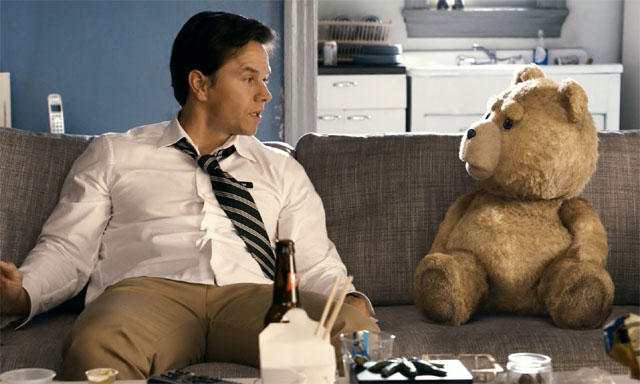
Film: Ted
Country: USA
Year of Release: 2012
Director: Seth McFarlane
Screenwriters: Seth McFarlane, Alec Sulkin, Wellesley Wild
Starring: Marky Mark, Mila Kunis
♥♥♥
Despite the fact that I’m not a big fan of Seth McFarlane’s hit animated series Family Guy, I was looking forward to his debut feature film Ted – not because I thought that it would be particularly magnificent, but because I imagined that it would represent something of a break from the endless production line of generic mainstream Hollywood fare that occupies our movie theatres. And while Ted disappoints by towing a narrative line that is utterly familiar, its blend of absurdity and profanity provides nearly two hours of engaging hilarity.
The film tells the story of John Bennet, a young friendless boy whose Christmas wish is granted when his Teddy Bear comes to life, providing him with a companion to whom he pledges lifelong commitment. Ted soon becomes a media phenomenon, garnering global fame and establishing a network of famous friends (the film overflows with cameos from real-world celebrities, many of whom with Teddy has carnal knowledge). But as John and Ted move into the world of adulthood and the arc of Ted’s celebrity falls, the odd couple’s relationship becomes defined by stasis. And when John (Mark Wahlberg) starts to get serious with his girlfriend Lori (gamely played by Mila Kunis), something has to change…
Ted operates on three levels, satisfying three different audiences segments. Firstly, as I’ve already suggested, the film consists of a very standard narrative in which its protagonists are faced with a conflict that is ultimately resolved through an act of redemption, much like 80% of all the films that ever show in our cinemas. Then there’s the simple gross-out layer, which consists of fart-jokes and low-level profanity and which is admittedly pretty thin in the film. And then there’s a level of super-profane humour, which is the thing that takes Ted to a higher level than most of its multiplex compadres.
Ted is very funny indeed as it repeatedly steps well beyond the bounds of decency while playing the idea of a talking teddy bear remarkably straight. Ted is pretty much a stand-in for the bong-smoking, booze-swilling, porn-watching resolutely un-ambitious losers that populate much of contemporary comedy, except that he gets away with a whole bunch more because, hey, he’s a teddy bear. Much of Ted’s humour involves the kind of things that we shouldn’t really laugh at but do, and a good portion of it is so funny precisely because it goes too far. (A teddy bear simulating oral sex, to give but one example, stretches the joke to extremity by simulating ejaculation). And so there’s much in the film that might fall flat in a live stand-up show aimed at a similarly broad audience – simply because it’s so generously offensive – but works uproariously well coming out of the mouth of a teddy bear.
McFarlane’s Family Guy is something of an idiosyncracy. The series has been massively successful while making little impact on the broader culture. You don’t have to be a fan of The Simpsons or South Park to recognise the characters or their trademark lines. Family Guy has achieved the strange feat of becoming one of the most successful cartoon series of all time without anyone beyond its extensive fan-base really noticing. I suspect part of the reason for this is that while the series continually goes for the jugular, it does so within the constraints of an utterly familiar sitcom context and format. The Simpsons and South Park have also spent many glorious years expanded the limits of moral outrage but they have also expanded what we can expect from narratives. Both of those series have literally taken us to other dimensions. In my limited viewings of Family Guy, the series has never left middle America. Which is, I suspect, much of the point, but it’s also the thing that prevents it from overflowing into the culture at large. I mention all of this because Ted operates on exactly the same level and has the same feeling of an artistic glass ceiling.
Ultimately though, Ted just manages to rise above the level of creative mediocrity that defines most American cinema, while being far more entertaining. Part of the reason for Ted’s failure to reach any great heights is McFarlane’s deep love for middle-brow culture. While the film is filled with cultural references, they are by no means esoteric. Instead, they are the kind of references that will be familiar to anyone who has spent a large portion of the last three decades in front of their television set. While Ted spends much of its time being offensively profane, its generic plot structure provides a counterpoint which in many ways neutralises the darkness of its humour. So while Ted is essentially a standard romcom, covered in layers of profanity, it made me laugh my head off. Sometimes that’s enough.
© PETER MACHEN 2017